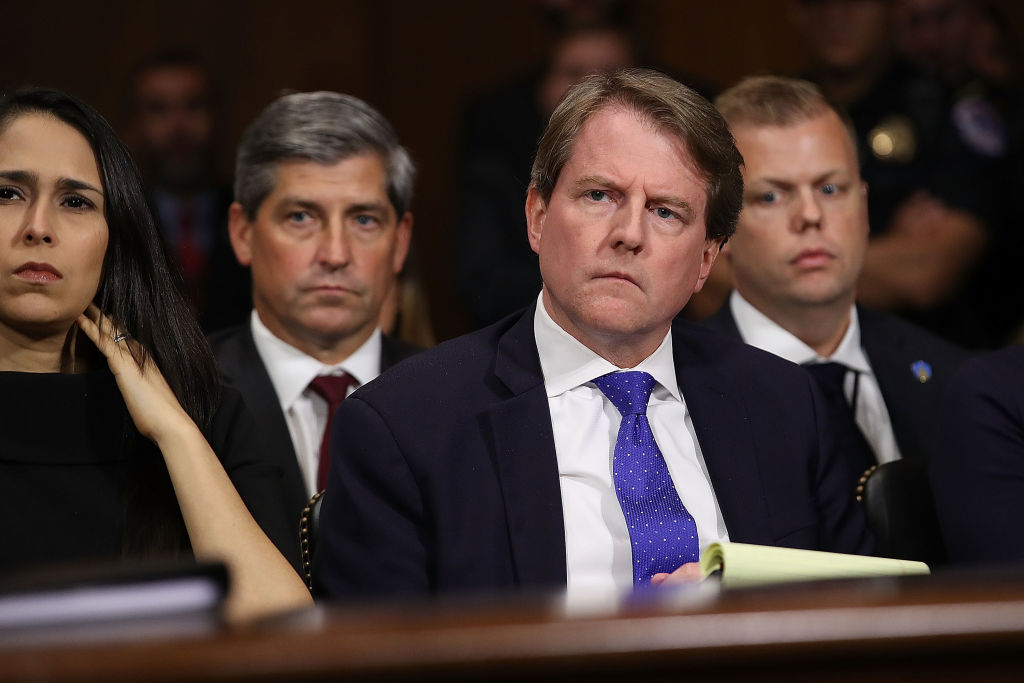
The House Judiciary Committee filed a complaint in federal court Wednesday to enforce a subpoena compelling former White House Counsel Don McGahn to testify about his time in the Trump administration. It’s a move committee aides touted as another crucial step in weighing whether to move forward with impeachment proceedings.
“The Judiciary Committee is now determining whether to recommend articles of impeachment against the President based on the obstructive conduct described by the special counsel. But it cannot fulfill this most solemn constitutional responsibility without hearing testimony from a crucial witness to these events: former White House Counsel Donald F. McGahn II,” the complaint reads.
The announcement of this complaint comes less than two weeks after the committee filed suit to obtain the grand jury materials from Mueller’s report from the Department of Justice, another instance where they stressed the need to obtain the information in order to make a decision on impeachment.
McGahn was a key witness in the section of former Special Counsel Robert Mueller’s report on Russian interference in the election that assessed whether President Trump tried to obstruct the probe. Mueller laid out 10 instances of possible obstruction, but ultimately concluded he could not make a determination one way or the other. Attorney General William Barr then determined there wasn’t sufficient evidence to charge the president with obstruction. But McGahn, who reportedly spent over 30 hours with Mueller’s team, was a key witness in nearly all of those instances. It was McGahn, for instance, who refused a direction from the President to fire Mueller – threatening to quit before carrying it out – and then refused to deny the story when it appeared in the media.
“McGahn is indeed the most critical witness against the President on every level, he is the witness who can talk about every element of the offense from virtually all the obstructive actions that we’re looking at,” said an aide on the House Judiciary Committee.
After Mueller’s report was released to the public in April, the committee had issued a subpoena for McGahn to appear before the committee by May 21. McGahn, at the orders of the White House who argued that he was immune from a compulsory appearance, declined to do so. “Consistent with that advice as reflected in [a legal memorandum from the Department of Justice], the President has unambiguously directed my client not to comply with the Committee’s subpoena for testimony,” McGahn’s counsel William Burck wrote in a May 20 letter to House Judiciary Chairman Jerrold Nadler. “As with the subpoena for documents, Mr. McGahn again finds himself facing contradictory instructions from two co-equal branches of government.”
The complaint the committee filed in court seeks to dispel that notion of immunity, which one aide described as “spurious.” “It’s an invented doctrine that we think will, as it has before, not hold up to court scrutiny,” said the aide, noting that when former President George W. Bush’s White House Counsel Harriet Miers had issued a similar claim to avoid congressional testimony the court ruled against her.
Burck said in a statement Wednesday that if the court ruled in the committee’s favor, his client would appear, but indicated that was the only scenario in which he would comply with the subpoena.
“People should not forget that Don McGahn is a lawyer and has an ethical obligation to protect client confidences, and as I have said before, Don does not believe he witnessed any violation of law. And the President instructed Don to cooperate fully with the special counsel but directed him not to testify to Congress unless the White House and the Committee reached an accommodation,” Burck said. “When faced with competing demands from co-equal branches of government, Don will follow his former client’s instruction, absent a contrary decision from the federal judiciary.”
The White House did not immediately respond to request for comment.
But even if the Judiciary Committee is correct in assessing that they have a winning argument, they still face one obstacle over which they have no control – timing. Although the committee has requested quick action from the court, they have no idea when a final decision could come. “[Its] very hard to predict,” one aide acknowledged. This lack of clarity that is unlikely to sit well with the growing group of activists and lawmakers who want to see the House of Representatives launch impeachment proceedings immediately.
That committee aide, however, disputed the notion that waiting for these legal decisions could cause agitation. I don’t think anyone should assume that we’re just going to be sitting and waiting for judicial decisions,” the aide said. “We have a lot of other activity that we’re pursuing…all with the goal of gathering as much evidence as possible that we can ultimately use any hearing to inform the committee’s decision making about articles of impeachment.”
More Must-Reads from TIME
- Donald Trump Is TIME's 2024 Person of the Year
- Why We Chose Trump as Person of the Year
- Is Intermittent Fasting Good or Bad for You?
- The 100 Must-Read Books of 2024
- The 20 Best Christmas TV Episodes
- Column: If Optimism Feels Ridiculous Now, Try Hope
- The Future of Climate Action Is Trade Policy
- Merle Bombardieri Is Helping People Make the Baby Decision
Write to Alana Abramson at Alana.Abramson@time.com